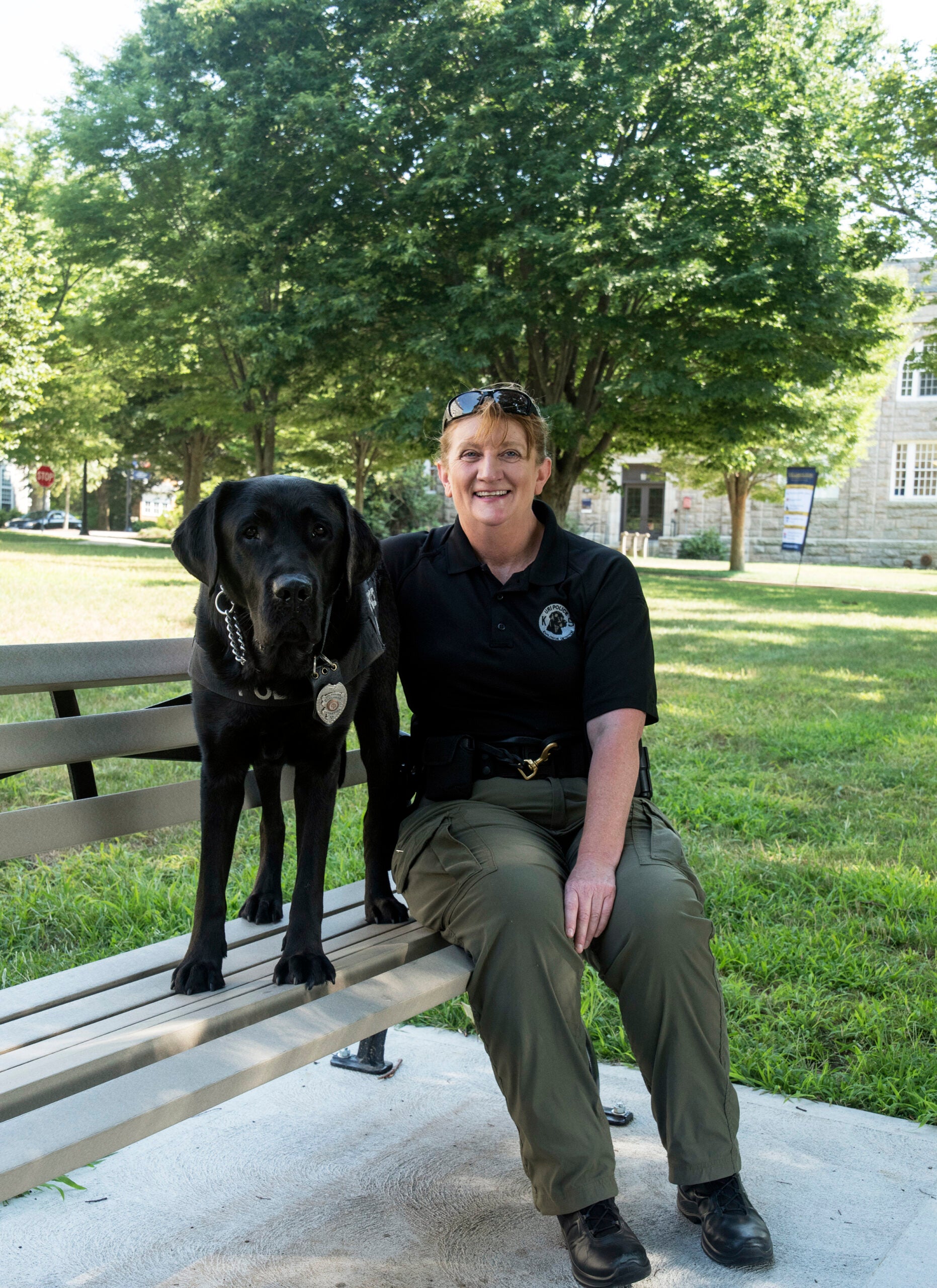KINGSTON, R.I. — Feb. 27, 2020 — University of Rhode Island Police Sgt. Erica Vieira recently completed the Prevention of and Response to Suicide Bombing Incidents course at New Mexico Institute of Mining and Technology. Completion of the course means that Vieira is certified by the U.S. Department of Homeland Security to train other law enforcement personnel on the topic.
According to the course website, first responders are guided through the nine phases of a bombing Incident, particularly those carried out by suicide bombers. Students are presented with the tools to recognize a suicide bombing threat and countermeasure planning tools to prevent and/or mitigate the effects of such an attack.
The training complements her experience in search and rescue, and explosive detection. Vieira and Officer Figaro, the department’s first explosive-detecting dog, are a common site as they train in every single building on campus. Vieira says that her additional training, along with the expertise of the police department, will enhance the community’s safety.
“This was for first responders, police fire and EMTs. It gives you the history and threat of suicide bombings in the U.S.,” Vieira said. “It mainly teaches first responders what to look for in materials that can be found commonly in stores, which are called precursor chemicals. If you see an abundance of these materials in everyday settings, it should set off an alarm. If you see certain things, which could be the ingredients of a bomb, you should really pay attention to them.”
The 36-hour training took place at the Energetic Materials Research and Testing Center, a major research and training division of New Mexico Tech. The center specializes in the research, development, testing, and analysis of energetic materials for corporate and government clients. There were about 40 participants in this course from police departments from all over the country such as the LAPD, NYPD, LSP and several others.
The course emphasizes the history and nature of war and terrorism in the U.S. to help first responders better understand their underlying causes.
“They spoke about Islamic State (IS), Al Qaeda and some of the things that they’ve done and the reasons behind it; there’s a lot of history and it goes back centuries,” Vieira said. “Much of the time, the problems arise from different and competing factions in a country. In a nutshell, it’s about land, religion, property and things like that.”
But she added that among all the different types of terrorism, homegrown terrorism is one of the worst because it is highly unpredictable.
“You don’t know what you don’t know,” Vieira said. “We think ‘Oh that person was really nice, I wouldn’t have expected that.’ You have to know your environment. You know what fits and what’s normal in your environment. If there’s something there that wasn’t there before, you have to question it.
“We went up this mountain where they had bomb techs,” said Sgt. Vieira. “They brought us out to the site where they had set them and made them explode. We went to each station to examine what it was and how much damage it did. The second to the last day, they blew up a vehicle and a building.”
On the last day of the course, she took an online live test on an IPAD with Homeland Security to earn trainer certification.
R.I. State Fire Marshal’s course
Vieira also completed the Bomb-making Materials Awareness Program through Homeland Security at the Rhode Island Fire Academy. Taught by Bruce Quinn of the Rhode Island State Fire Marshal’s Office, the course helps businesses and their employees identify and report suspicious purchases of common items, such as pool sanitizers, fertilizers, and paint removers, which can be used to make bombs.
“The instructors don’t recommend that you go and accuse the person or become confrontational, because safety is paramount,” Vieira said. “It educates the public about what to look for, what is suspicious, what’s not normal and what you should do. Pay attention! Your observations are very important, such as where this person is going, what kind of vehicle they own, when did they leave the store. All of this intelligence is vital, but it must be done without being observed by the person in question of course.”
She added that since information on making bombs is easily available online, people have to be more cautious and vigilant about their environment.
“Large amounts of certain chemicals can be used to make homemade explosives and that’s really scary,” Vieira said. “The general public should be educated on what’s not normal, and question why does this person have all these things, why are there hundreds of cases of acetone being delivered to this residence, they don’t own a beauty supply store. What is going on here?”
The training also elaborated on the workings of explosives, particularly IEDs (Improvised Explosive Devices) and how they are made.
“I learned so much during these courses,” Vieira said. “Anything can happen, anytime and anywhere. Just because this is a rural area doesn’t mean that it can’t. This whole community is like a big family to me and I am very approachable. If people think someone is acting strange, you can tell me or report it anonymously.”
Edhaya Thennarasu, an intern in the Marketing and Communications Department at URI and Communications major, wrote this press release.

